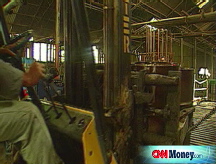Oil prices fall on demand jitters
Crude falls as investors focus on a weak demand outlook. OPEC official says the cartel will hold another emergency meeting.
NEW YORK (CNNMoney.com) -- Oil prices fell Friday as investors took cues from from the selloff in stocks as an indicator of weak global demand for energy.
Light, sweet crude for December delivery fell $1.20 to settle at $57.04 a barrel in New York. The contract briefly fell below $56 to a session low of $55.69 a barrel.
Oil traders have been tracking global equity markets as a means of assessing the severity and duration of the economic downturn and its impact on energy demand. As a result, oil prices tend to rise and fall in tandem with world stock indexes.
On Thursday, the Dow Jones industrial average surged 552 points, marking its third-largest single-day point gain ever, as stocks bounced off a nearly 5-year low. Crude prices followed suit, climbing $2.08 to settle at $58.24 a barrel.
But the momentum did not carry over into Friday's session.
"The rally yesterday was not a fundamental change," said Tom Pawlicki, oil industry analyst at MF Global in Chicago. He added that the oil market will continue to focus on stock prices.
Stocks were lower in volatile trading Friday after a government report showed U.S. retail sales dropped by the largest amount on record in October.
Adding to the market's malaise, ailing mortgage finance firm Freddie Mac (FRE, Fortune 500) reported a $25 billion quarterly loss that will force it to start tapping emergency taxpayer bailout funds.
OPEC: Friday's retreat comes despite news that OPEC will hold an unscheduled meeting to discuss the rapidly declining price of crude.
An unnamed official confirmed the Organization of the Petroleum Exporting Countries will hold an emergency meeting in Cairo on Nov. 29, according to published reports.
OPEC cut oil output by 1.5 million barrels a day Oct. 24 in an attempt to prevent further declines in oil prices.
Another OPEC production cut could have a "short-term impact" on the price of oil, Pawlicki said. "At the same time, the economic news is so dire that it may not create a lasting bottom in the price of oil."
Indeed, the price of crude has come down 9% since OPEC scaled back output last month, suggesting the oil market's fear of weak demand trumps the cartel's efforts to control the price by limiting supply.
Concerns that a looming global recession will continue to undermine demand for gasoline and other petroleum products has driven the price of oil down 60% since July's all-time high above $147 a barrel.
European recession: Demand concerns were highlighted Friday by grim figures from the European Union indicating that the euro zone economy has officially entered a recession.
Major indexes in Europe were higher despite the recession diagnosis. Germany's DAX index led gainers, rising 3% in afternoon trading. London's FTSE was up 2.7% and the CAC-40 in Paris advanced 1.2%.
Markets in Asia rallied overnight. The Nikkei in Japan added 2.7% and Hong Kong's Hang Seng index rose 2.4%.
Separately, finance officials in Hong Kong said the territory's economy is also in recession after it contracted for the second quarter in a row.
Meanwhile, leaders from 20 of the world's most powerful nations prepared to meet this weekend in Washington to discuss the global financial crisis.
Retail gasoline: Gas prices continued to fall Friday reaching a 21-month low.
The national average price for a gallon of regular gas shed 2.6 cents overnight to $2.152, according to a daily survey by the American Automobile Association.
Friday's national average is down $1.962, or 48%, from the record high price of $4.114 that AAA reported on July 17. ![]()





